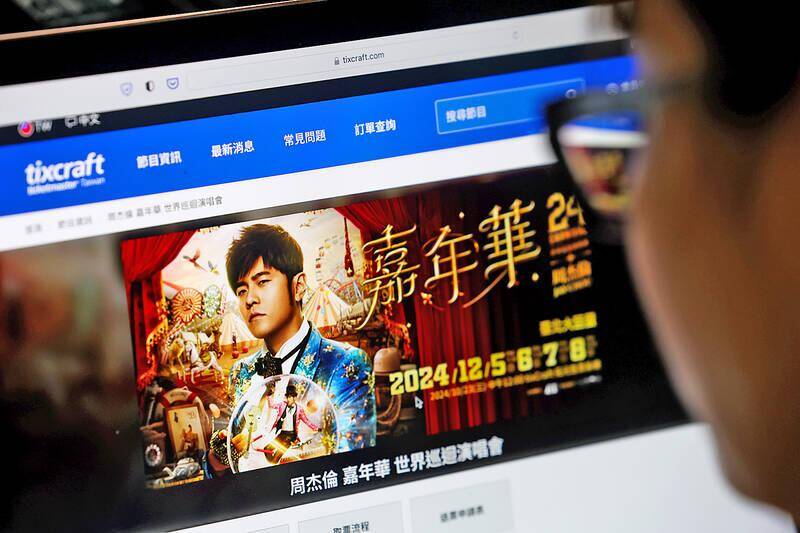Several major cities have backed measures incentivizing the use of real-name registration for concerts at publicly owned venues in a bid to curb ticket scalping, the Ministry of Culture said yesterday.
The agreement to adopt or drum up interest in the anti-scalping measures came following a meeting with representatives from Taiwan’s six special municipalities last month, the ministry said in a statement.
Some of the proposed incentives include making real-name registration part of rental contracts or letting promoters who use such a system for concerts with more than 10,000 tickets rent publicly owned venues at a discount, the ministry said.

Photo: CNA
According to the ministry, the Taipei City Government said it planned to grant promoters requiring real-name registration to buy tickets for concerts held at eligible venues or during the busy season discounted rent.
The Kaohsiung City Government has also agreed to work toward adopting similar measures for the venues it oversees, the ministry said.
The ministry added that it would continue to help promoters cover the costs of implementing real-name registration for buying tickets.
Ticket scalping has plagued several high-profile concerts in Taiwan in recent years.
In one notable case, scalped tickets were found sold online for Mandopop singer Jay Chou’s (周杰倫) concerts last month at the Taipei Dome, with resale prices as high as NT$300,000 — more than 43 times the face value.
Police later arrested several people for allegedly scalping tickets to Chou’s concerts.
Under an amendment to the Development of the Cultural and Creative Industries Act (文化創意產業發展法) that cleared the legislative floor in May 2023, people who resell tickets to cultural or artistic events at inflated prices could be fined 10 to 50 times the ticket’s original value, while those who use proxies to secure tickets face a prison term of up to three years and/or a potential fine of up to NT$3 million.

The Coast Guard Administration (CGA) and Chunghwa Telecom yesterday confirmed that an international undersea cable near Keelung Harbor had been cut by a Chinese ship, the Shunxin-39, a freighter registered in Cameroon. Chunghwa Telecom said the cable had its own backup equipment, and the incident would not affect telecommunications within Taiwan. The CGA said it dispatched a ship under its first fleet after receiving word of the incident and located the Shunxin-39 7 nautical miles (13km) north of Yehliu (野柳) at about 4:40pm on Friday. The CGA demanded that the Shunxin-39 return to seas closer to Keelung Harbor for investigation over the

National Kaohsiung University of Science and Technology (NKUST) yesterday promised it would increase oversight of use of Chinese in course materials, following a social media outcry over instances of simplified Chinese characters being used, including in a final exam. People on Threads wrote that simplified Chinese characters were used on a final exam and in a textbook for a translation course at the university, while the business card of a professor bore the words: “Taiwan Province, China.” Photographs of the exam, the textbook and the business card were posted with the comments. NKUST said that other members of the faculty did not see

The Taipei City Government yesterday said contractors organizing its New Year’s Eve celebrations would be held responsible after a jumbo screen played a Beijing-ran television channel near the event’s end. An image showing China Central Television (CCTV) Channel 3 being displayed was posted on the social media platform Threads, sparking an outcry on the Internet over Beijing’s alleged political infiltration of the municipal government. A Taipei Department of Information and Tourism spokesman said event workers had made a “grave mistake” and that the Television Broadcasts Satellite (TVBS) group had the contract to operate the screens. The city would apply contractual penalties on TVBS

A new board game set against the backdrop of armed conflict around Taiwan is to be released next month, amid renewed threats from Beijing, inviting players to participate in an imaginary Chinese invasion 20 years from now. China has ramped up military activity close to Taiwan in the past few years, including massing naval forces around the nation. The game, titled 2045, tasks players with navigating the troubles of war using colorful action cards and role-playing as characters involved in operations 10 days before a fictional Chinese invasion of Taiwan. That includes members of the armed forces, Chinese sleeper agents and pro-China politicians